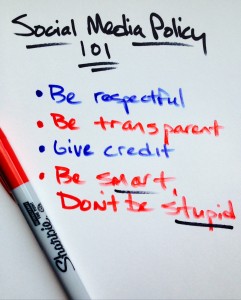Topic four discussed ethical issues involved when social media is used for business or education. The discussions surrounding this topic were intriguing and wavered in numerous directions. Many of my peers decided to focus on the issues raised by social media use in business. I particularly enjoyed reading Alysia Wildman’s post; her use of examples and info-graphics help to explain her main argument that employees become “unintended brand ambassadors” when they join a company.
I was particularly interested in social media use in education because it has lately been a current theme on the BBC news. My view points are expressed in my previous blog. Social media is now an integral part of many young people’s lives, with almost half of young people aged between 8 and 17 having profiles on social networking sites (Ofcom, via Teaching Times) and therefore makes itself a valuable tool for student engagement, interest and interaction.
With this strong pull towards the integration of social media and education I think educators need guidance so that these ethical issues are reduced. In the same way that businesses should train their staff or create policies to facilitate appropriate social media usage.
Our online discussions on twitter sparked an interesting debate. Many questioned whether employers could judge potential candidates on their intelligence through their social media actions. My opinions have altered on this debate. I know that my teacher, Bob Frost, has a highly regarded maths degree and therefore presumably is a very intelligent man. However, his racist Facebook status did not reflect this intelligence and cost him his job and his position as a Tory MP. I think there could have been many reasons that fuelled his controversial online statements but I don’t believe it highlights his lack of intelligence, I think it represents his lack of understanding with regard to the power behind social media. Either that, or his integrity surrounding his personal views of the topic and his fiery nature that lead him to post the comments.
To conclude, I strongly believe educators, employees, in fact anyone with a social presence, should be warned and educated about the dangers of posting online whilst we continue the steep slide into the digital, social-media driven age.
Additional articles:
I like how this article by Herron, 2010, describes social media as ‘word of mouth on steroids’ and how to use social media as an intelligent user – worth a read.
Top tips for Social Media Policies: “Be smart. Don’t be stupid”, McKeown, 2013.




